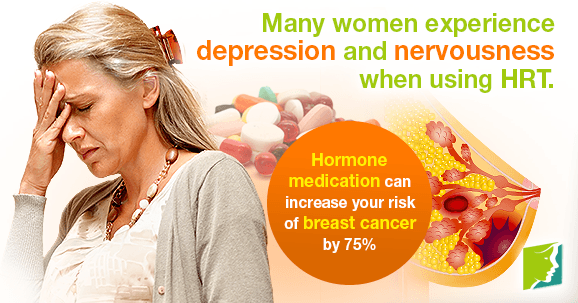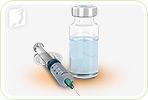When it comes to your emotions during menopause, you are dealing with a very sensitive balance between chemicals in the brain and hormones throughout the body. Whether it's anxiety, anger, or depression taking over, you may want to rethink drastic and risky hormone medication.
Their effects are singular, temporary, and actually have no evidence of improving your mental state. Understand that lowered hormone levels are completely normal during menopause, and trying to medically change that comes with consequences. Herbs or lifestyle adjustments are sufficient for boosting mood for many women.
The Function of Hormonal Medication
The intended purpose of the medication is to restore sex hormones levels that are fluctuating during menopause, thereby helping your body deal with menopausal symptoms. In other words, taking hormone replacement therapy (HRT) is ingesting artificial estrogen and progesterone.
It is found to temporarily relieve hot flashes, vaginal dryness, and urinary incontinence, among other menopause symptoms. Due to its dangers, it is advised to be taken only for short-term purposes; however, menopause is a long-term process for most women. For this reason, many rely on it for longer than they should, unbeknownst to its potentially counterproductive and unsafe effects.
Will it Make Me Happier?
HRT will give you temporary relief of some menopausal symptoms, but mood swings are not one of them. Many people experience depression and nervousness when using hormonal medication. If you thought your mood swings were bad before, HRT can potentially make them worse. It can make you very disoriented with even less of a natural ability to handle your feelings.
Additional Dangers
Hormone medication has been found to cause fever, fatigue, diarrhea, vomiting, and yellowing of the skin as potential side effects. Although claimed to be identical to estrogen, not every woman reacts well to this medication. Further, it has been inextricably linked to breast and endometrial cancer, as well as cardiovascular disease. In fact, it can increase your risk of breast cancer by 75%.
Alternatives
Moodiness is often a result of poor lifestyle decisions and the need for proper natural sustenance.
Exercise. Getting regular exercise will boost your gamma-aminobutyric acid (GABA), endorphin, and serotonin levels, which induce strong feelings of joy and relaxation. Try yoga or 40 minutes of cardio and notice profound improvement in your mindset.
Food. Lay off excessive sugar, caffeine, alcohol, and fatty foods. Good mood is synonymous with proper nutrient intake, especially during menopause. A wide array of fruits, colorful vegetables, whole grains, beans, and controlled intake of lean meats guarantees a boost.
Herbs. Black cohosh, dong quai, red clover, and fennel are all dense with phytoestrogens that can be safely assimilated into your body at a much lower cost. However, they should not be used in the long term.
Friends. Spending time with loved ones enhances mood very quickly. Instead of retreating into your room to sob, try doing something fun with friends or family. This releases oxytocin, which inspires feelings of love and loyalty.
Do not be fooled by the claims of hormone medications. Though these medications are effective to a degree, it will not stabilize your emotions. It is not a decision to be taken lightly, and often the solution is much simpler than you think. The suggested life adjustments may take a bit more effort than popping a pill, but your emotional and physical health is worth it.
Sources
- BREASTCANCER.ORG. (2013). Using HRT (Hormone Replacement Therapy). Retrieved February 10, 2014, from http://www.breastcancer.org/risk/factors/hrt
- National Institutes of Health. (2010). Estrogen and Progestin (Hormone Replacement Therapy). Retrieved February 10, 2014, from http://www.nlm.nih.gov/medlineplus/druginfo/meds/a601041.html




